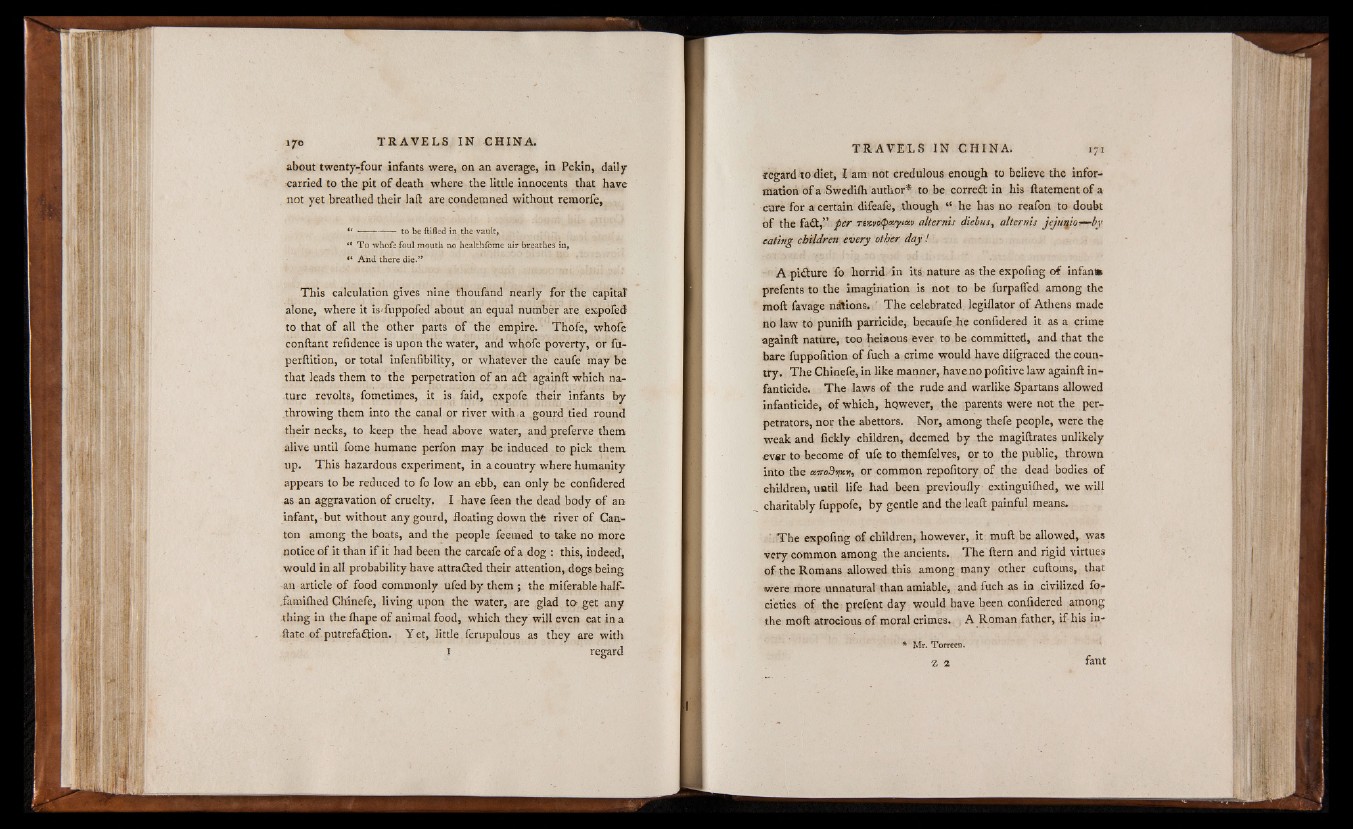
about twenty-four infants were, on an average, in Pekin, daily
carried to the pit o f death where the little innocents that have
not yet breathed their laft are condemned without remorfe,
“ — —— — to be ftifled in, die-vault,
“ T o whofe foul mouth no healthfome air breathes in,
** A n d there die.”
This calculation gives nine thoufand nearly for the capital
alone, where it is'fuppofed about an equal number are expofed
to that o f all the other parts o f the empire. Thofe, whofe
conftant refidence is upon the water, and whofe poverty, or fii-
perftition, or total infenfibility, or whatever the caufe may be
that leads them to the perpetration o f an a£t againft which nature
revolts, fometimes, it is, faid, expofe their infants by
throwing them into the canal or river with a gourd tied round
their necks, to keep the head above water, and preferve them
alive until fome humane perfon may be induced to pick them
up. This hazardous experiment, in a country where humanity
appears to be reduced to fo low an ebb, can only be confidered
as an aggravation o f cruelty. I have feen the dead body o f an
infant, but without any gourd, floating down the river o f Canton
among the boats, and the people feemed to take no more
notice o f it than i f it had been the carcafe o f a dog : this, indeed,
would in all probability have attracted their attention, dogs being
an article o f food commonly ufed by them ; the miferable half-
.familhed Chinefe, living upon the water, are glad to get any
thing in the ihape o f animal food, which they will even eat in a
ftate o f putrefaftion. Y e t , little fcrupulous as they are with
i regard
regard-to diet, i am not credulous enough to believe the information
o f a Swediih author* to be correCt in his ftatement o f a
cure for a certain difeafe, though “ he has no reafon to doubt
o f the fa£t,” p er Ttwo<p«,yim/ alternis dielus, alternis jejupo-r—by
eating children every other day ! ,
A piCture fo horrid in its nature as the expofing o f infante
prefents to the imagination is not to be furpafled among the
moft favage nations. The celebrated, legiflator o f Athens made
no law to puniih parricide, becaufe he confidered it as a crime
againft natiire, too heinous ever to be committed, and that the
bare fuppofition o f fuch a crime would have difgraced the country.
The Chinefe, in like manner, have no pofltive law againft infanticide.
The laws o f the rude and warlike Spartans allowed
infanticide, o f which, hQwever, the parents were not the perpetrators,
nor the abettors. Nor, among thefe people, were the
weak and fickly children, deemed by the magiftrates unlikely
ever to become o f ufe to themfelves, or to the public, thrown
into the airoSrinti, or common repofitory o f the dead bodies o f
children, until life had been previoufly extinguiihed, we will
charitably fuppofe, b y gentle and the leaft painful means.
The expofing o f children, however, it muft be allowed, was
very common among the ancients. The ftern and rigid virtues
o f the Romans allowed this among many other cuftoms, that
were more unnatural thim amiable, and fuch as in civilized for
cieties o f the prefent day would have been confidered among
the moft atrocious o f moral crimes, j A Roman father, if- his in-
* Mr. Torreen.
Z 2 faut